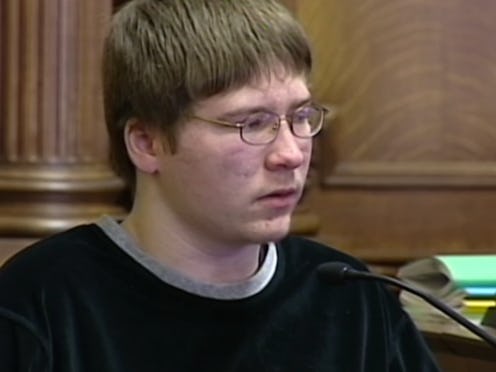Entertainment
Where's The Outrage Over Brendan Dassey's Case?

After Making a Murderer debuted on Netflix on Dec. 18, Steven Avery became a household name practically overnight. I constantly hear his name at work, at social gatherings, and it's all over my Facebook newsfeed. And, in case you've been living under a rock for the past month — people are positively outraged about Avery's murder conviction. But, another person is behind bars for Teresa Halbach's murder and I'm both baffled and disturbed by the fact that Steven Avery's nephew, Brendan Dassey, is getting far less public attention and support than Avery. Like many viewers, I have countless questions about the integrity of the investigation and whether or not Making a Murderer was a fair depiction. However, right now my main question is why aren't more people paying attention to Dassey's case?
There are two separate petitions on Change.org requesting presidential pardons for Avery and Dassey. Obama doesn't have the power to pardon either man because these are both state cases, not federal ones — so, neither petition is going to be especially effective. However, it's worth looking at the number of signatures on each because it illustrates that people are far more invested in one case than the other. As of Feb. 10, the petition for Avery has over 501,000 signatures. Meanwhile, the petition for Dassey is just shy of 88,000 signatures. Why in the world does Dassey have just 17 percent of the support shown for his uncle?
The people who believe Avery to be innocent have no shortage of theories about who really killed Teresa Halbach. (If you don't believe me, just spend a few hours on the Making a Murderer Reddit page.) If anyone believes that Dassey committed this horrific crime on his own, they're certainly in the minority because I haven't heard this possibility entertained anywhere — in the news, at social gatherings, on Reddit, or by the legal experts dissecting the case. And, although Making a Murderer certainly focuses mainly on Avery, Dassey's case was by no means ignored — so no one who watched the series can plead ignorance.
I hate to be cynical, but I think it's because Avery's case is so sensational and Dassey's is far more commonplace. Avery spent 18 years behind bars for a crime he didn't commit, was finally exonerated by DNA evidence, and then charged with murder two years later. During his trial, Avery's lawyers claimed that members of the Manitowoc County Sheriff's Department planted evidence because they genuinely believed him to be guilty — but plenty of viewers think he was framed due to his pending $36 million lawsuit against the department. The Manitowoc police department denies any wrongdoing and is not under investigation for any crime.
Avery's story sounds like something out of the pages of a fictional crime novel, or the plot of a Law and Order episode. Meanwhile, there was no physical evidence pointing to Dassey and his defense centered around the claim that he made a false confession — and this doesn't have quite the "wow" factor of an alleged police conspiracy. But false confessions aren't uncommon, so that's even more reason that we should be paying close attention to Dassey's case — it's an excellent opportunity for us to learn about something that happens way more often than something as "sexy" as a police conspiracy.
False confessions are most common amongst juveniles and individuals with low IQs — and Dassey falls into both those categories. He was 16 at the time of his interrogation and his IQ has been reported to be 70. A study conducted by Northwestern Law looked at 340 exonerations of both adults and juveniles. It showed that 42 percent of juvenile wrongful convictions involved false confessions, while only 13 percent of the exonerated adults had confessed. Research published by Psychology and Law showed that individuals with low IQs are more likely to make false confessions. In both juveniles and low IQ individuals, the reasoning behind the false confessions is that they have a lower understanding of the long-term consequences of their actions. Furthermore, they're more likely to feel frightened and confused during an interrogation — which means they can be more easily manipulated into telling authority figures what they want to hear.
These statistics and research are probably not as "exciting" or "sensational" as the idea of a police department planting blood evidence in order to prevent a massive lawsuit from moving forward. But, Making a Murderer is more than simply entertainment — it's about the tragic murder of a young woman and the possibility that two innocent individuals are behind bars. If we're going to demand action from government officials, we have an obligation to educate ourselves and conduct some of our own independent research — because there's no way filmmakers could have included all relevant information in a 10 hour series. And, if we want to consider ourselves activists for the wrongfully convicted, then we certainly shouldn't base our support on whose story is the most "interesting."
Images: Netflix (3)